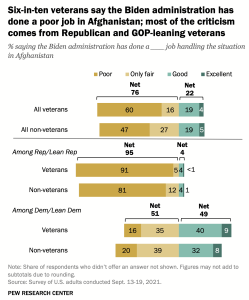
In the aftermath of the U.S. withdrawal from Afghanistan, Pew Research Center looked at how military veterans were feeling about the decision to pull all troops out of that country, how they assessed Joe Biden’s handling of the situation and how they felt more broadly about Biden’s approach to foreign policy.
What we found was that veterans’ views on the decision to withdraw troops and their assessment of the overall success or failure of the U.S. mission in Afghanistan were not markedly different from the views of those who have not served in the military. In a survey conducted Aug. 23-29, 2021 (before all American troops had left Afghanistan), 52% of military veterans said the U.S. decision to withdraw troops was the right one, while 47% said it was wrong. The balance of opinion was roughly similar among adults who have not served in the military, with 54% saying it was the right decision to withdraw troops and 42% saying it was the wrong decision. In that same survey, solid majorities of veterans (67%) and non-veterans (69%) said the U.S. mostly failed in achieving its goals in Afghanistan.
A second survey conducted in September took a closer look at views of Biden’s leadership on these issues. Here veterans were significantly more critical than non-veterans, though both groups were mostly critical of Biden. Six-in-ten veterans said the Biden administration had done a poor job handling the situation in Afghanistan. This compared with 47% of non-veterans. Some 16% of veterans said Biden had done a fair job in this area, as did 27% of non-veterans. Only a quarter or fewer in either group said the administration had done an excellent or good job.
Six-in-ten veterans said the Biden administration had done a poor job handling the situation in Afghanistan.
Views on the U.S. withdrawal from Afghanistan and Biden’s handling of the situation differed widely by partisan identification – both among veterans and non-veterans. Republicans and Republican-leaning independents were less supportive of the decision to pull troops out of the country and more critical of the Biden administration’s approach than Democrats and Democratic leaners.
In fact, most of the strong criticism of the Biden administration in the survey came from Republicans, with 91% of Republican veterans and 81% of Republicans who didn’t serve in the military saying his administration had done a poor job handling the situation in Afghanistan.

The overall differences in views between veterans and non-veterans are partially a reflection of the partisan leanings of the veteran population. Previous Pew Research Center studies of veterans have found that, as a group, they are more likely than non-veterans to align themselves with the Republican Party. And veterans who identify as Republican or lean to the GOP were more than five times as likely as Democratic or Democratic-leaning veterans in our survey to give the Biden administration a poor rating for the job it’s done in Afghanistan.
Looking more broadly at views of Biden’s handling of foreign policy and military affairs, there are significant gaps in the opinions of veterans and non-veterans, mainly at the extremes. Roughly half of veterans said they have no confidence at all in Biden’s ability to make good decisions about foreign policy or in his ability to use military force wisely. In each case, only a third of non-veterans expressed the same view.
Eight-in-ten Republican veterans said they are not at all confident in Biden when it comes to making the right decisions about foreign policy and the use of military force.
Partisanship is strongly linked to these views as well, with Republicans much more critical than Democrats of Biden’s abilities. But even among Republicans, veterans stood out in their criticism of the president’s ability to make the right decisions in these areas. Eight-in-ten Republican veterans said they are not at all confident in Biden when it comes to making the right decisions about foreign policy and the use of military force.
These party dynamics also came into play in veterans’ assessments of Donald Trump – but with the opposite effect. A May 2019 Pew Research Center survey found veterans were more approving than the public at large of the way Trump was handling his job as commander-in-chief of the military (57% of veterans approved vs. 41% of all adults). Among Republicans, 92% of veterans approved of the way Trump was handling this aspect of his job, higher than the share of all Republicans (81%). Among Democrats, only 6% of veterans and 8% of all adults approved of the job Trump was doing as commander-in-chief.
Pew Research Center’s data is a valuable tool in helping understand veterans’ views on issues to which they bring a unique perspective. What our research has shown is that veterans are not immune from the party divides that so define our political lives these days. This extends not only to their attitudes about the Afghanistan withdrawal and even the war in Iraq, but also to their view of future threats. Roughly two-thirds of GOP veterans – but only one-in-four of their Democratic brethren – say Taliban control of Afghanistan poses a major threat to U.S. security.
Kim Parker is director of social trends research at Pew Research Center.




